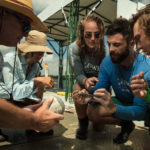Honoring Northwest Florida’s Spanish history
Resurrecting Spanish history through the archeological study of Northwest Florida's beginnings, University of West Florida scholars and students have continued to put pieces of the past together and also recently played a part in welcoming King Juan Carlos I and Queen Sophia of Spain to Pensacola as part of the city's 450th Anniversary Celebration.
Resurrecting Spanish history through the archeological study of Northwest Florida’s beginnings, University of West Florida scholars and students have continued to put pieces of the past together and also recently played a part in welcoming King Juan Carlos I and Queen Sophia of Spain to Pensacola as part of the city’s 450th Anniversary Celebration.
“We are extremely honored to participate in welcoming the king and queen of Spain to Northwest Florida,” said Judy Bense, UWF president.
Having dedicated her professional career as an archaeologist to the research and study of Pensacola’s Spanish roots, Bense was honored to be a part of the royal visit. She participated in a wreath laying ceremony at the base of the bust of Gen. Galvez at Fort George in Pensacola, which is the former site of the British Fort George in North Hill.
“This is the site where the famous Spanish general won the battle of Pensacola in 1781 and retook West Florida from the British Empire and they never returned again,” said Bense. “West Florida was Spanish until it was sold to the United States in 1821. Gen. Galvez is a great Spanish hero to the Spanish people and they treasure his memory.”
In addition to Bense representing UWF at the wreath laying ceremony, the UWF Symphonic Band played the Spanish and U.S. national anthems for the king and queen during a ceremony at Ferdinand Plaza. Following the ceremony, the royals attended a presentation by UWF archaeology and history graduate students and faculty about the Spanish artifacts on display from the Emanuel Point I shipwreck, one of Don Tristan De Luna’s ships discovered in 1992 in Pensacola Bay.
“The Spanish people, as represented by the royalty, strongly support the manner in which we conduct the study of our shared heritage in West Florida,” said Bense. “The scholars at UWF keep them informed, ask permission and share our finds with our citizens. What we’ve done at UWF has resurrected Pensacola’s Spanish history – 300 years of which had all been but forgotten. This is part of the reason the royals came here to Pensacola.”
Dedicated to the exploration of Pensacola Spanish connections, UWF plans to continue to explore the city’s waterways and historical sites for archaeological finds. The soon-to-be-built Vice Admiral John H. Fetterman State of Florida Maritime Museum will showcase finds from both “Emanuel Point I” and “Emmanuel Point II,” a second Luna shipwreck discovered by UWF in 2006.
“We want the community and our Spanish friends to know that we hope to find the other four Luna wrecks. The additional historical artifacts that they yield will be a part of the world-class Maritime Museum and Research Center,” said Richard Brosnaham, executive director of the T. T. Wentworth, Jr., Florida State Museum. “Pensacola truly values its Spanish heritage and UWF is committed to preserving that history for generations to come.”
Pensacola’s 450th anniversary celebration marks the beginning of a decade of anniversary celebrations across the state of Florida. The oldest settlement in Florida, Pensacola is the first city in the state to launch anniversary festivities. Fort Myers and St. Augustine will follow with 450th anniversary celebrations in 2013 and 2015 respectively.
For more information, contact the UWF President’s Office at (850) 474-2200.
Written by Megan Tyson, University Marketing Communications


